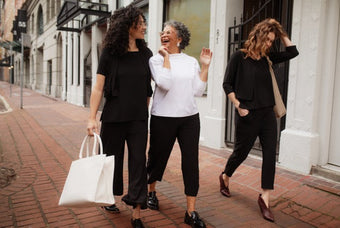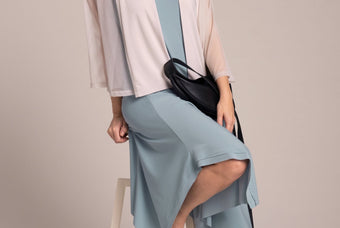An Interview with Stacey Huget, Executive Director of the Looking Glass Foundation for Eating Disorders
Self-love is a positive, feel-good mantra that has taken the online world by storm in recent years. They are also Sympli values that drive our versatile designs every day. What lies beneath it, however, is a very real problem that should not be oversimplified. The disheartening truth is that there are far too many women who suffer from a distorted, and undervalued sense of self. For years Sympli has been a proud supporter of the Looking Glass Foundation, sharing the belief that every woman is perfectly whole when they are purely themselves. And that we are all gorgeous just the away we are.
The Looking Glass is an organization that strives to raise awareness and offer support to those affected by eating disorders. It is a serious illness, with a complexity that should be talked about. It is also a cause for which the fashion industry must accept responsibility and take an active role in.
Executive Director of the foundation, Stacey Huget, agreed to an interview with us in which she explains her mission and the very real struggle many still face today.
Why was it necessary to create the Looking Glass Foundation?
 In 2002 three mothers, Deborah Grimm, Dolores Elliot, and Cindy Dobbe were desperate to find help for their daughters, all of which were struggling with eating disorders. Canada’s lack of resources forced them to seek treatment at a facility in the United States, adding exorbitant costs to an already emotionally fraught journey of recovery.
In 2002 three mothers, Deborah Grimm, Dolores Elliot, and Cindy Dobbe were desperate to find help for their daughters, all of which were struggling with eating disorders. Canada’s lack of resources forced them to seek treatment at a facility in the United States, adding exorbitant costs to an already emotionally fraught journey of recovery.
Fed up with this inadequacy they banded together and created the Looking Glass Foundation. It’s been a long road, but the foundation has expanded immensely to include the Looking Glass Residence, an annual summer camp, live support agents, and a plethora of online and digital resources to aid and educate people on the complexity of eating disorders.
The Looking Glass Foundation has since impacted the lives of thousands of individuals and families affected by this disease. The daughters of all three founding mothers are also now happily recovered.
What do you feel is the biggest struggle faced by those with eating disorders?The struggles are as complex as they are difficult. It’s impossible to narrow it down to only one. Last year we launched the Something’s Gotta Give campaign, discussing how we can really work to get to the other side of this disease.
Sufferers, more often than not, hit a wall of ignorance which deters them from trying to seek further help. Those who have been hospitalized have very few options for treatment after they leave. What does exist is restrictive, expensive, and often incompatible with the schedules and commitments of daily life. Our campaign, Something’s Gotta Give, has culminated into a full feature documentary (premiere screening held December 2017).
Do you feel that there is a stigma that prevents sufferers from coming forward? Why do you think that is?Absolutely! Eating disorders are accompanied with a lot of shame which prevents people from seeking help. People don’t understand that it is a serious disease, not a lifestyle choice.
There are also plenty of barriers that prevail throughout our mainstream culture. There is confusion and misinformation on what is ‘healthy food’, what constitutes reasonable exercise, and of course, all the unrealistic beauty standards that make individuals feel inadequate. Cases of eating disorders are also hugely under-represented in statistics. It’s not that the public doesn’t care, they just aren’t well enough informed to realize how serious of a problem it is!
“There is nothing more important than feeling comfortable in your own skin.”
What role do you think fashion plays in women’s self-image?
Fashion plays a huge role. When women go shopping and try on clothing that should be their size, and it doesn’t fit, they feel inadequate. The problem at the root of this is that beauty has become equated with being thin. Women are forced by the fashion industry to be constantly comparing themselves to a false ideal, one that clearly doesn’t represent reality.
Modelling agencies aren’t at the core of the issue; it’s the clothes themselves, and the designers who make them for mannequins instead of real people. It’s a distorted culture of perfection and celebrity, one that demands the impossible from women. It can be extremely toxic.
How can fashion change the way women see themselves for the better?Sympli is a fantastic example of a brand that does just that!
Clothing should be designed for women with real bodies. It should showcase them and make them feel comfortable and beautiful in their own skin. Sadly, the majority of fashion brands focus on how women should look, rather than how they truly feel. It takes courage to design clothes for all women. If this was the rule rather than the exception, I have no doubt that the rates of eating disorders would plummet.
Can you explain the name of the foundation and the significance of the ‘Looking Glass’?We get a lot of questions about that, and we find that it can mean very different things to different people. Without sounding too limiting, I would say that the mirror plays a significant role in how we see ourselves. If our view is distorted, it can compromise our whole life.
The Looking Glass Foundation aims to support women to see their true selves, without compromise. We want them to look in the mirror and love themselves for everything that they are.
In an ideal world, how would you like to see women judge their own worth?I would want women not to judge their own worth, but to celebrate it; It shouldn’t be a conditional thing. Every individual has intrinsic value, and this is something they should recognize and cherish. I would love to see women assume and declare their worth, defining it however they wish to. That’s how we should all live our lives.
Before becoming Executive Director of the Looking Glass Foundation, Stacey Huget enjoyed 30 successful years as an executive and consultant in the private sector — two decades of which were also spent hiding her devastating battle with an eating disorder, depression, and alcoholism. Happily, recovered now for 13 years. Stacey looks forward to a day when eating disorders are something we remember as a thing of the past.
Self-love is a positive, inclusivity and real beauty standards should be approached actively by the fashion industry. Us at Sympli embrace these values to drive our versatile designs every day to be part of the active change that the fashion world so needs.
For more information on the Looking Glass Foundation visit http://www.lookingglassbc.com.







